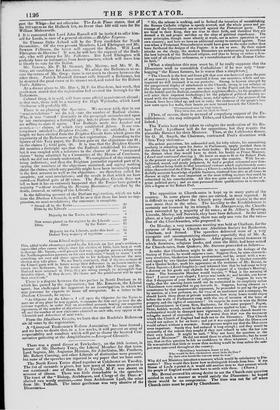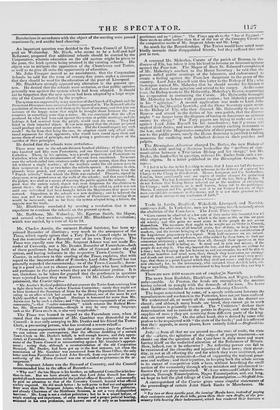The opposition to Church-rates is kept up in many parts
of the country. In some places the rates are carried, in most rejected. It is difficult to say whether the Church party should rejoice in the one case more than in the other. The hostility to the Establishment is certainly not lessened by its triumph. In Abergavenny, the Church- men succeeded by a majority of 65 votes ; at St. Alban's, Reading, Lincoln, Morley, anTNorwich, they have been defeated. In the latter place, at a large public meeting, there was only one vote for the rate—
that of the Churchwarden, who proposed it.
On Monday, a very numerous meeting was held at Chatham, for the purpose of forming a Church-rate Abolition Society for Rochester, Chatham, and Strood. The speeches delivered were of a very
energetic and uncompromising character; especially that of Mr. A. H. Stevens, of Strood, a Quaker. After giving several instances in which furniture, religious books, and even the Bible had been seized for Church-rates, from Quakers, Mr. Stevens proceeded as follows— In order that Churchmen might be able to appreciate the feelings of the Society of Friends, be would suppose a case. Suppose that, by some extraordi. nary revolution, Quakerism because predominant, and he, armed with a war- rant signed by two Quaker Justices, and accompanied by a Quaker constable and a Quaker broker, made his appearance at the residence of Mr. Bernal, in Eaton Square—(Loud laughter)—and informed him that be had come to levy a distress on his goods and chattels for the support of a Quaker's Meeting- house. The honourable Meniber would inquire, " What is the meaning of this? I never saw your chapel; I never was inside it; and besides, you know that I disapprove of your forms of religious worship." Suppose he were to reply, that the meeting-house could not be maintained in its simplicity unless Churchmen were compelled to pay towards it. Suppose, having silenced re - monstrance by that unanswerable argument, he proceeded to put up the goods by auction, at a low pothouse, or, for ‘seart of an auctioneer and a company, he should hawk them about at private residences, how many hours would elapse before the walls of Parliament rung with the cry of invasion of the laws of property and the rights of conscience? Or suppose he were to seize the Bibles and Concordances in Canon Row, Rochester, for the same purpose? Papist, Deist, Infidel, wretch, would be the mildest terms applied to him. The drum ecclesiastical would be thumped most vigorously, and every church would re. echowthe sound of execration. Yet far worse than that was the treatment which the Church of England had dealt out to the Dissenters. That Church would not endure it fur an hour ; and yet it was expected that the Dissenrers would submit without a murmur. Some persons might say that the Dissenters were impatient. Surely they had endured it long enough ; and they would be unworthy of the redress they sought if they now refused to take the law into their own hands. It might be said, " Why not leave the question in the bands of Ministers?" He did not stand there to attack Ministers; but he must sav, that on this question he felt no confidence in them whatever. ( Cheers.) lie was satisfied that little or worse than nothing would be done unless the sub. ject were canvassed throughout the country.
" Hereditary bondsmen, know ye not,
Who would be free, themselses must strike the blow ? By their own bands the ransom must be non." Why did not Ministers introduce a measure which would be satisfactory to Dis- senters? They would then know how to distinguish friends from foes. If the House of Lc:ode rejected it, it would add another item to that account which the people of England would soon have to settle with them. ( Cheers.)
Mr. Bernal avowed his strong desire to see the Church-rate question settled in such a manner as would satisfy the Dissenters: be hoped there would be no compromise. The time was not far off when Church-rates must be paid by Churchmen. Resolutions in accordance with the object of the meeting were passed unanimously, and amidst loud cheering.



























 Previous page
Previous page